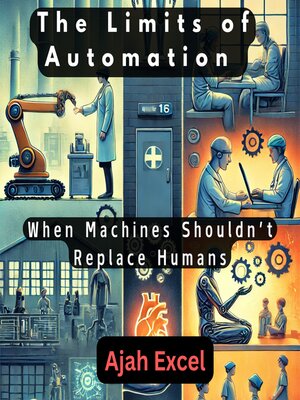The Limits of Automation
audiobook (Unabridged) ∣ When Machines Shouldn't Replace Humans
By Ajah Excel

Sign up to save your library
With an OverDrive account, you can save your favorite libraries for at-a-glance information about availability. Find out more about OverDrive accounts.
Find this title in Libby, the library reading app by OverDrive.



Search for a digital library with this title
Title found at these libraries:
| Library Name | Distance |
|---|---|
| Loading... |
This audiobook is narrated by a digital voice.
The Limits of Automation: When Machines Shouldn't Replace Humans is a compelling examination of the boundaries of technology, exploring the critical question of when and where human judgment, empathy, and creativity should take precedence over automation. As artificial intelligence and robotics continue to advance, this thought-provoking book delves into the areas where machines fall short—and why human presence remains irreplaceable.
Through engaging narratives and in-depth analysis, the book tackles scenarios where the over-reliance on automation has led to unintended consequences, from algorithmic biases in hiring practices to tragic errors in self-driving vehicles. It explores sectors such as healthcare, education, and criminal justice, where human qualities like compassion, intuition, and ethical reasoning play an essential role that machines cannot replicate.
Each chapter sheds light on the ethical, practical, and philosophical implications of automation. It examines critical questions: What are the limits of machine learning and AI? How do we define tasks that require "human touch"? And when does efficiency come at the cost of humanity?
The Limits of Automation also offers historical context, tracing the evolution of automation from the industrial revolution to the AI-driven workplaces of today. It highlights lessons learned from past attempts to automate complex human tasks and draws parallels to current challenges, offering readers a nuanced understanding of the balance between progress and restraint.
The book goes beyond critique to propose actionable strategies for harmonizing human and machine roles. It advocates for the thoughtful design of hybrid systems that combine the strengths of automation—speed, precision, scalability—with the unique capabilities of humans, such as critical thinking and moral judgment.







